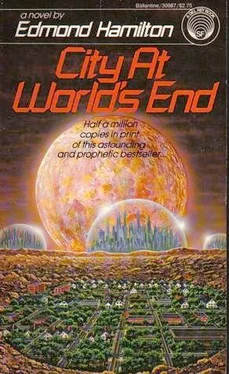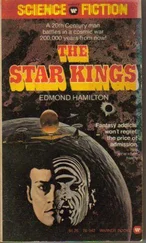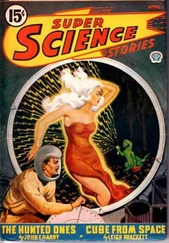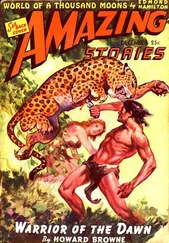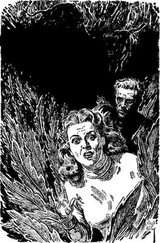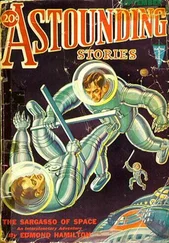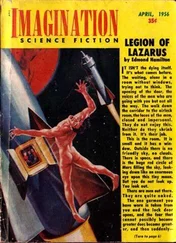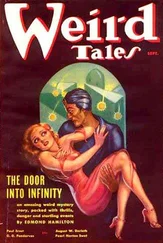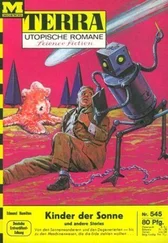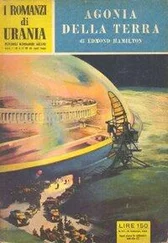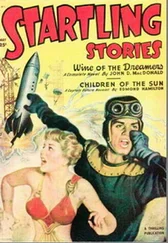It was strange to come upon old Middletown, standing so silent in the midst of desolation. The houses were as he had last seen them, the doors locked, the empty porch swings rocking in the cold wind. The streets were drifted thick with dust. The trees were bare, and the last small blade of grass had died.
Kenniston saw that Hubble’s eyes were misted, and his own heart con-tracted with a terrible pang of longing. He wished that he had not come.
Back in that other city, absorbed in the effort to survive, one could almost forget that there had been a life before.
He drove the jeep through those deathly streets, and memory spoke to him strongly of lost summers—girls in bright frocks, catalpa trees heavy with blossom, the quarreling of wrens, and the lights and sounds of human voices in the drowsy evening. Piers Eglin was speechless with joy, lost in a historian’s dream as he walked the streets and looked into shops and houses.
“It must be preserved,” Eglin whispered. “It is too precious. I will have them build a dome and seal it all—the signs, the artifacts, the beautiful scraps of paper!”
Hubble said abruptly, “There’s someone here ahead of us.” Kenniston saw the small bullet-shaped car that stood outside the old Lab. Out of the building came Norden Lund and Varn Allan.
She spoke to Eglin, and he translated, “They have been gathering data for her report to Government Center.”
Kenniston saw the distaste in the woman’s clear-cut face as her blue eyes rested on the panorama of grimy mills, the towering stacks black with forgotten smokes, the rustling rails of the sidings, the drab little houses huddled along the narrow streets. He resented it, and said defiantly. “Ask her what she thinks of our little city?”
Eglin did, and Varn Allan answered incisively. The little historian looked uneasy when Kenniston asked him to interpret.
“Varn Allan says that it is unbelievable people could live in a place so pitiful and sordid.”
Lund laughed. Kenniston flushed hot, and for a moment he detested this woman for her cool, imperious superiority. She looked at old Middletown as one might look at an unclean apes’ den.
Hubble saw his face, and laid a hand on his arm. “Come on, Ken. We have work to do.”
He followed the older man into the Lab, Piers Eglin trailing along. He said, “Why the hell would they put a haughty blonde in authority?”
Hubble said, “Presumably because she is competent to fill the job.
Don’t tell me old-fashioned masculine vanity is bothering you?”
Piers Eglin had understood what they were saying, for he chuckled.
“That’s not such an old-fashioned feeling. Norden Lund doesn’t much like being Sub for a girl.”
When they came out of the building with the materials Gorr Holl had requested, Varn Allan and Lund were gone.
They found, upon their return to New Middletown, that Gorr Holl and his crew were already at work disassembling the generators. Bellowing orders, thundering deep-chested Capellan profanity, attacking each generator as though it were a personal enemy, Gorr Holl drove his hard-handed spacemen into performing miracles of effort.
Kenniston, in the days that followed, forgot all sense of strangeness in the intense technical interest of the work. Laboring as he could, eating and sleeping with these star-worlders though the long days and nights, he began to pick up the language with amazing speed. Piers Eglin was eager to help him, and after Kenniston discovered that the basic structure of the tongue was that of his own English, things went more easily.
He discovered one day that he was working beside the humanoids as naturally as though he had always done it. It no longer seemed strange that Magro, the handsome white-furred Spican, was an electronics expert whose easy unerring work left Kenniston staring.
The brothers, Ban and Bal, were masters at refitting. Kenniston envied their deftness with outworn parts, the swift ease with which their wiry bodies flitted batlike among the upper levels of the towering machines, where it was hard for men to go.
And Lal’lor, the old grey stodgy one of the massive body, who spoke little but saw much from wise little eyes, had an amazing mathematical genius. Kenniston discovered it when Lal’lor went with him and Hubble and Piers Eglin to look at the big heat shaft that seemed to go down to the bowels of Earth.
The historian nodded comprehendingly as he looked at the great shaft and its conduits. It descended, he said, to Earth’s inmost core.
“It was a great work. It and others like it, in these domed cities, kept Earth habitable ages longer than would otherwise have been the case.
But there is no more heat in Earth’s core to tap, now.” He sighed. “The doom of all planets, sooner or later. Even after their Sun has waned they can live while their interior heat keeps them warm. But when that interior planetary heat dies the planet must be abandoned.”
Lal’lor spoke in his throaty, husky voice. “But Jon Arnol, as you know, claims that a dead, cold planet can be revived. And his equations seem unassailable.”
And the bulk gray Miran—for that star had bred him, Kenniston had learned—repeated a staggering series of equations that Kenniston could not even begin to follow.
Piers Eglin, for some reason, looked oddly uncomfortable. He seemed to avoid Lal’lor’s gaze as he said hastily, “Jon Arnol is an enthusiast, a fanatic theorist. You know what happened when he tried a test.”
As soon as Kenniston could make himself understood in the new tongue, Piers Eglin considered that his duty was done and he departed for Old Middletown, to shiver and freeze and root joyfully among the archaic treasures that abounded in every block. Left alone with the star-worlders, Kenniston found himself more and more forgetting differences of time and culture and race as he worked with them to force life back in-to the veins of the city.
They had New Middletown’s water system in full operation again, and the luxury of opening one of the curious taps and seeing water gush forth in endless quantities was a wonderful thing. Many of the great atomic generators were functioning now, including a tremendous auxili-ary heating system which made the air inside the dome several degrees warmer. And Gorr Holl and Margo had been working hard on the last miracle of all.
There came a night when the big Capellan called Kenniston into one of the main generator rooms. Magro and a number of the crewmen were there, smeared with dust and grease but grinning the happy grins of men who have just seen the last of a hard job. Gorr Holl pointed to a window.
“Stand over there,” he said to Kenniston, “and watch.” Kenniston looked out, over the dark city. There was no moon, and the towers were cloaked in shadow, the black canyons of the streets below them pricked here and there with the feeble glints of candles and the few electric bulbs that shone around the City Hall. Gorr Holl strode across the room behind him, to a huge control panel half the height of the wall. He grunted.
There was a click and a snap as the master switch went home, and suddenly, over that nighted city under the dome, there burst a brilliant flood of light.
The shadowy towers lit to a soaring glow. The streets became rivers of white radiance, soft and clear, and above it all there was an new night sky—the wondrous luminescence of the dome, like a vast bowl fashioned out of moonbeams and many-colored clouds, crowning the gleaming towers with a glory of its own. It was so strange and beautiful, after the long darkness and the shadows, that Kenniston stood without moving, looking at the miracle of light, and was aware only later that there were tears in his eyes.
The sleeping city woke. The people poured out into the shining streets, and the sound of their voices rose and became one long shout of joy.
Читать дальше
